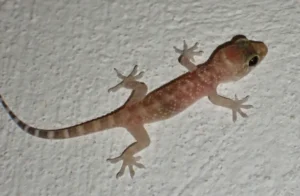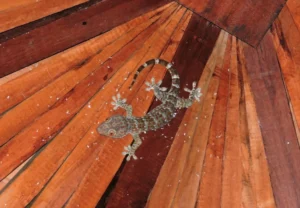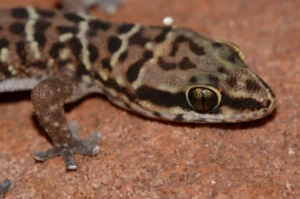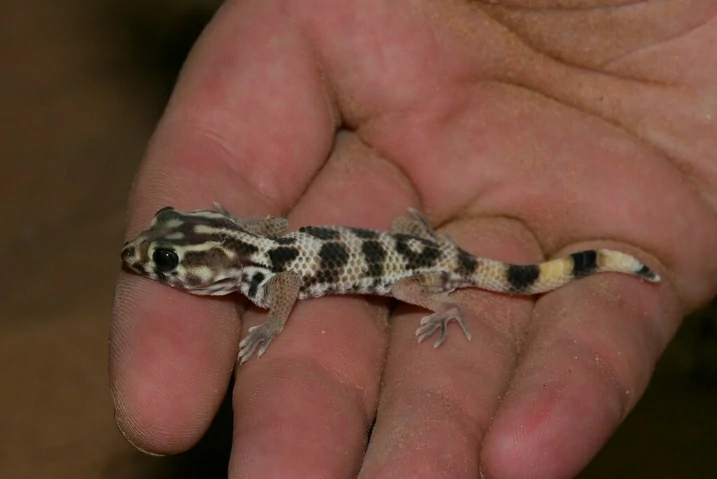If you’ve ever switched on a light at night and seen a gecko clinging to your wall, you’ve probably noticed what happens next.
The moment you move closer, it darts away. You stop, it stops. For a second, it stares at you, then disappears behind a picture frame or curtain.
That reaction makes a lot of people wonder: do geckos actually avoid humans?
Yes, most geckos avoid humans because they see us as big, unpredictable predators. They’re cautious, not mean. Their instinct tells them to run, even when we don’t mean them any harm. But over time, especially around calm and gentle people, some geckos learn to stay put and share space comfortably.
Why Geckos See Humans as a Threat
To a gecko, size means danger.
We’re huge compared to them, and we move fast. That alone is enough to trigger fear. In the wild, a big moving shadow usually means trouble.

So when a gecko sees us coming close, its first thought isn’t “Who’s that?”, it’s “Get out of here!”
It’s not personal, it’s pure survival.
Still, not every gecko reacts the same way. Wild ones are much jumpier than house geckos. But after enough time living around people, many house geckos stop seeing us as threats.
How Wild Geckos Behave Around People
In forests, deserts, or rocky areas, wild geckos almost never see humans.
If they do, they often freeze for a second, flatten against bark or stone, then vanish in a flash.
That quick reflex helps them survive birds, snakes, and small mammals. To them, we’re just another big shape passing through.
Researchers who study them in Southeast Asia often say the same thing, one crunch of a leaf, and the gecko’s gone.
In the wild, shyness is what keeps them alive.
Do House Geckos Act Differently?
Yes, and that’s what makes them interesting.
House geckos,like the common house gecko (Hemidactylus frenatus), live right next to us. They rest on ceilings, hide behind wall clocks, and come out at night when the lights attract insects.

At first, they stay skittish. But if people ignore them instead of chasing them, something shifts.
They start treating humans like part of the background.
After a few weeks or months, house geckos can get surprisingly bold. You can walk around, talk, or even clap, and they’ll keep hunting mosquitoes on the wall like nothing happened.
Why Movement and Noise Scare Geckos
Geckos rely heavily on sight and vibration.
Loud footsteps or fast hand movements feel like danger. Even deep voices or slamming doors can scare them.
When you move too quickly, the gecko doesn’t think about it, it just reacts. Running might save its life.
They can even feel air movement. If you wave your hand nearby, they sense that tiny air shift and jump before you reach them.
That sensitivity keeps them alive but also explains why they seem so jumpy around us.
How Long Does It Take for a Gecko to Feel Safe?
If a gecko lives in your home, you might notice a pattern.
At first, it hides every time the light comes on. After a few weeks, it starts peeking out earlier. Eventually, it might sit on the same wall while you watch TV.

That’s learning in action. They figure out that humans aren’t dangerous, and their fear fades.
That’s one big reason house geckos do so well in cities, they can learn to trust.
Can Geckos Recognize Individual Humans?
That’s a fun question, and the answer is: maybe, in their own way.
Geckos have sharp eyes and good memory for movement patterns. They might not recognize your face, but they can remember how you move.
If someone always waves or tries to grab them, they’ll hide fast. But with someone calm and slow, they’ll stay put.
So no, they don’t know who you are, but they can tell whether you feel safe or not.
How Captive Geckos React to Humans
Pet geckos (like leopard or crested geckos) live very different lives from wild ones.
They rely on us for warmth, water, and food. Still, instincts don’t disappear.
A new pet might hide for weeks whenever you open its tank. But with gentle handling and regular feeding, that fear fades.
Some even peek out when they hear footsteps near feeding time, that’s trust being built, one meal at a time.
Do Wild Instincts Ever Fully Disappear?
Not really. Even the calmest gecko still has its wild programming.
If something startles it (a loud sound or quick motion) it’ll bolt.
That doesn’t mean it’s unhappy. It’s just how geckos stay alive.
Centuries of evolution taught them: run first, think later.
When Geckos Actually Approach Humans
You might be surprised, but some geckos do approach people, sort of. It’s not affection, it’s opportunity.
In places where people cook or eat outdoors, geckos crawl closer because insects gather around lights or food scraps.
They’re not saying hello, they’re just joining the buffet.
Still, that comfort means trust. If one hangs near your chair, it’s decided you’re safe enough to ignore.
Why Touching a Gecko Isn’t a Good Idea
Even if one seems calm, it’s best not to touch it. Their skin is delicate, and human hands carry oils or chemicals that can irritate it.
Also, stress hits reptiles hard. A scared gecko might drop its tail to escape. That tail grows back, but it costs energy.
If you really like geckos, the kindest thing you can do is watch them quietly and let them come close on their own terms.
Do Geckos Understand Human Voices?
Not exactly, but they feel tone and vibration. Low, calm voices sound less threatening than loud or high-pitched ones.

Some pet geckos even act calmer when their owners talk softly while feeding them. They might not know words, but they pick up the feeling behind them.
Why Geckos Choose to Live in Human Spaces
If they avoid us, why live with us? Because our homes have warmth, light, and insects ,all the things they need.
It’s a quiet partnership. Geckos enjoy the environment we create, not our company. They stay on walls, out of reach, and come out when we’re not around.
We attract their food, and they pay us back by eating mosquitoes. Fair trade, right?
Can Geckos Learn to Trust Specific Humans?
Yes, especially pet geckos. Trust looks different in reptiles, but it’s real.
A gecko that eats from your hand or lets you get close without hiding has learned you’re safe.
That comes from consistency, no sudden grabs, no loud noises, just calm presence. Over time, fear turns into comfort.
What Happens When People Try to Tame Wild Geckos
Catching a wild gecko usually ruins its trust completely. Even if it survives in captivity, it’ll probably stay nervous forever.
Wild instincts go deep, and being taken from their home adds stress they can’t shake off.
If you admire geckos, it’s best to leave wild ones be and only keep captive-bred pets.
How to Make Geckos Feel Safe Around You
If you want geckos to hang around your home, you can help them out a bit:
-
Keep lights soft and steady at night.
-
Avoid spraying chemicals near walls or ceilings.
-
Move slowly if you spot one.
-
Leave a window or door partly open at dusk so insects (and geckos)can find their way in.
These small things make your home a calm and safe space for them.
Conclusion
So, do geckos avoid humans? Yes, but not because they hate us. They’re just cautious survivors.
At first, our size and movement scare them, but with time, they learn most people won’t hurt them.
In homes, that understanding grows into peaceful coexistence. Some geckos even share the same walls for years without running away.
Their fear isn’t rejection, it’s instinct. And their return shows how observant, adaptable, and quietly trusting geckos can be.
Hi, my name is Ezra Mushala, i have been interested animals all my life. I am the main author and editor here at snakeinformer.com.

